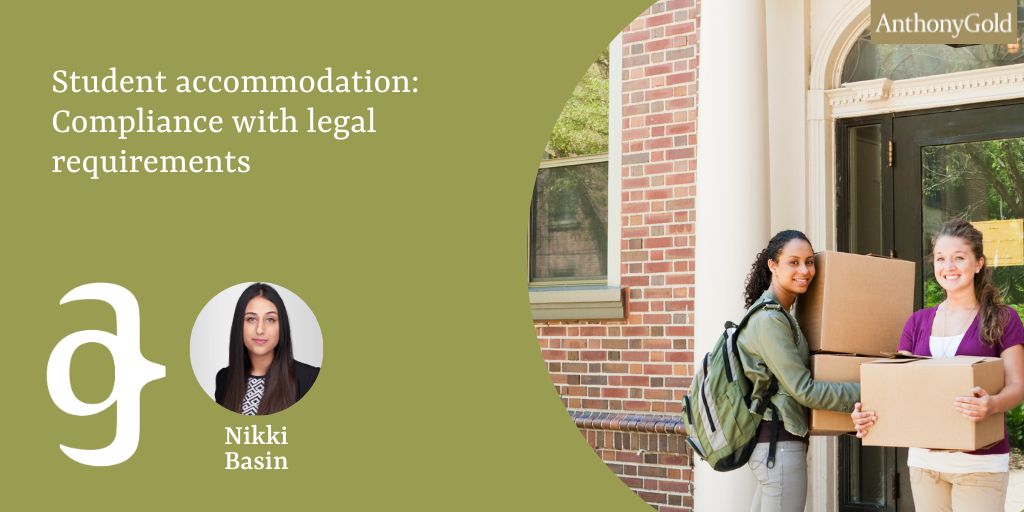Student accommodation: Compliance with legal requirements

Student accommodation providers have many legal obligations relating to the housing they offer to students. Ensuring legal compliance will not only assist in a smooth transition for the student into their new accommodation but is also vital to ensure that the University does not fall foul of its own obligations causing problems down the line.
There are various legal requirements at the start of the academic year. However, the focus of this blog is on some of the key information/documentation that must be provided to students and what this should set out.
Occupation Agreement
This is the agreement between the student and its landlord setting out the legal framework between them. The occupation agreement could be in the form of a licence or a tenancy, and the distinction is dependent on the substance of what has been agreed by the parties. Under a licence agreement a student may not have all legal rights that they would otherwise have had if the agreement is a tenancy. For example, under a licence agreement there is no obligation for the deposit to be protected.
The occupation agreement will have important clauses setting out the agreement relating to the duration of the agreement, the fees, the frequency of payments, the parties’ obligations and in what circumstances and when the agreement can be ended by both parties. For student accommodation, some occupation agreements may also be accompanied by student handbooks which form part of the agreement itself.
The occupation agreement is an important document as it sets out the basis of the agreement between the landlord and the student. Therefore, the terms of the agreement need to be clear and concise. If the agreement contains terms that are not clear and can be interpreted as unfair, then the terms of the agreement may be challenged. Ultimately, a court would decide if the terms are unfair.
Deposit
If a deposit has been taken in connection with an assured shorthold tenancy, then the deposit must be protected within 30 days of receipt and the prescribed information provided to the student. In the absence of this, the student can bring a deposit penalty claim for return of the deposit and 1-3 times deposit penalty.
Where a deposit has been taken in connection with a licence agreement, then the terms of the agreement should clearly set out the arrangements relating to any deposit that has been taken, where it is held and under what circumstances deductions may be made.
Gas Safety
As a student accommodation provider, you will need to ensure that you are complying with the Gas Safety (Installation and Use) Regulations 1998. This includes ensuring that any gas appliances, fittings and flues have been checked and are safe to use. The gas safety checks need to be carried out annually by a Gas Safe registered engineer and a copy of the gas check needs to be retained for at least two years.
You will need to ensure that a copy of the gas safety certificate is made available to each existing tenant following the check and to any new tenants before they move in. Failure to do so can result in the Health and Safety Executive taking enforcement action against you.
The UUK code which applies to higher and further education establishments who provide student housing also requires compliance with the gas safety regulations.
Electrical Safety Obligations
Private landlords are also under an obligation to ensure that the electrical installations are inspected every 5 years to ensure that the electrical safety standards in the Property are met. As a private landlord you also, need to provide a copy of the Electrical Installation Condition Report to any new tenants before they occupy. The requirement to inspect electrical safety installations every 5 years and provide an EICR report does not apply to any student accommodation providers where the student is residing in halls of residence.
However, this does not absolve the student accommodation provider of their responsibilities relating to electrical safety. Instead, the UUK Code sets out the requirements that need to be met and the information that needs to be provided to students relating to electrical safety. The requirements in the code apply to higher and further education establishments that provide student housing. These requirements include:
- Electric supply be maintained without interruption and the installations properly maintained and tested in accordance with statutory safety requirements and British Standards.
- All new and existing electrical installations including fixed equipment must be installed and maintained in accordance with the IEE Regulations (Institute of Electrical Engineers)
- Electrical installations in the building must be inspected and tested in accordance with statutory requirements and results recorded in the appropriate register.
- If there are portable appliances supplied or used then these must be inspected and maintained in accordance with the higher and further education establishments portable appliance testing (“ PAT”) policy.
- The student must be informed of the PAT policy and the procedure on how the student can have their electrical equipment tested.
- A procedure is required for dealing with any potentially dangerous electrical equipment.
- Information and advice relating to voltage differences must be provided to students at the beginning of their period of occupation.
Conclusion
There are many legal requirements if you are letting accommodation to students and whether they apply to you will depend on the type of the occupation agreement and the type of accommodation provider.
If you require advice relating to legal requirements in respect of student accommodation, then look no further and contact us to discuss your requirements.
* Disclaimer: The information on the Anthony Gold website is for general information only and reflects the position at the date of publication. It does not constitute legal advice and should not be treated as such. It is provided without any representations or warranties, express or implied.*
No comments